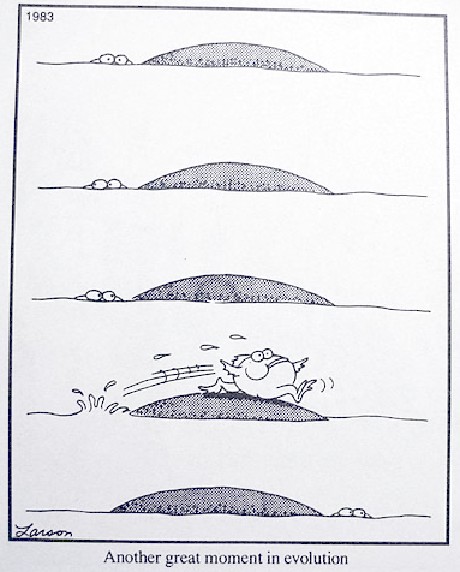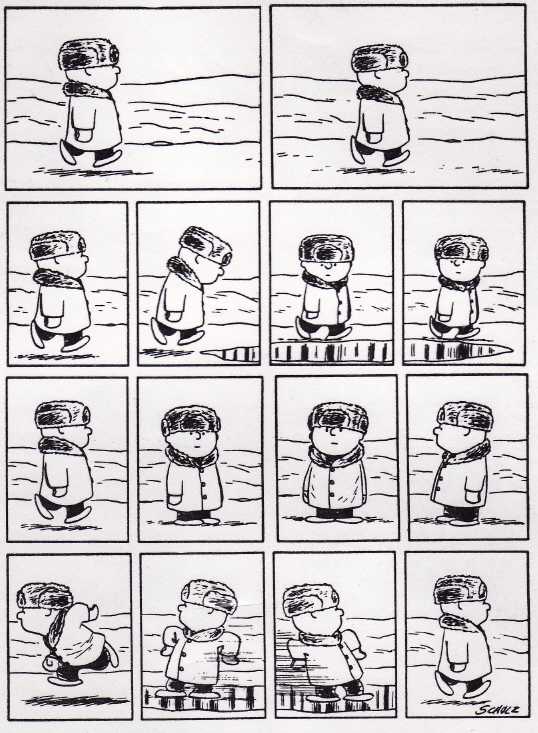
Deepak Chopra, the new age maven, regularly contributes to the Huffington Post. Today, he starts out with this:
I.
This year, the world celebrated Charles Darwin’s 200th birthday. But now that all the backslapping is nearing an end, it may be time to reflect on where things really stand. When Darwin finished writing “Origin of Species” in the fall of 1859 — exactly 150 years ago — the theory of evolution became part of the Newtonian world picture. However, since that time, major puzzles of mainstream science have forced a re-evaluation of the nature of the universe that goes far beyond anything Darwin could have imagined.
I’m trying to fathom Chopra writing his opening paragraph and not feeling as if he is about to fling into the Huffington winds something both patronizing to Darwin, and, something idiotic. Alas, to the tune of cash registers ringing, Chopra takes his insights seriously. No, this spiritual advisor to Oprah is onto to something with his colleague, Robert Lanza: the spiritualization of solipsism! Via quantum mechanics!!!
Science obviously investigates what it is able to investigate. There’s no move to re-evaluate the nature of the universe, when nature is posed as a lumpen “nature” in the way that Chopra means, and has meant in the past. Still, Chopra is playing a deceptive word game here too. He actually believes science is quite incapable when it comes to the re-evaluation he’s on about.
After this weird opener, Chopra moves on:
One new theory — called biocentrism — proposes that an accurate understanding of the world requires putting observers firmly into the equation, and that life may not be the accident of physics and chemistry that evolution suggests.
What the heck do you suppose the word “accident” means in this context? Anyway, Chopra is dancing, around the anthropic frame. Because Chopra is driving his ignorance toward the a-ha of biocentrism, he’s not going to entertain anything about what is really the case in science. Not amazingly, Chopra is mistaken twice in this sentence; but, what the heck, (he) might as well conflate both errors! First, one need not propose that understanding implies observers. This is a tautology. There are understandings by virtue of their being ‘understanders.’ Second, although randomness is a specific factor in the current model of biological evolution, the term accident is of zero import in this same model. Accident can’t do any duty in most cosmological arguments. It can do notional duty in the Just So argument, where it is the null consequent posited against the idea that this universe is the only possible universe given necessary initial features–that we don’t—yet—know anything about.
(This Just So idea isn’t held by cosmologists; as far as I know. I find it appealing. It fits one of my loosely held prejudices–that anthropomorphizing the “all-in-all” is much more boring than the alternative. So if it is unnecessary to do so, and unnecessary to pose a designer, because we live in the only possible universe, then our universe is much less boring. Although, this noted, I’m agnostic about favoring any single theory in the realm of speculative cosmological theorizing—due to my own technical ignorance.)
Chopra is superfically referring to a mash-up of controversies having to do with, variously, fine-tuning arguments, rare earth and rare biology hypotheses, and various implications of the anthropic principle. Each might be clearly differentiated, yet this isn’t entertained by Chopra.
The current model proposes that the universe was until rather recently a lifeless collection of particles bouncing against each other, and obeying predetermined rules that were mysterious in their origin. The universe is presented as a watch that somehow wound itself and that, allowing for a degree of quantum randomness, will unwind in a semi-predictable way. But there are many problems with this paradigm — some obvious, others rarely mentioned but just as fundamental. But the overarching problem involves life, even if the way it changes forms can be apprehended using Darwinian mechanisms.
Omigoodness. I suppose in Chopra’s scheme of things, 3.5+ billion years is recent, (against the age of the universe given as 13-14 billion years.) But, I don’t know of the particles bouncing aspect of any current model. And, his “allowing for a degree of quantum randomness, will unwind in a semi-predictable way” is simply meaningless.
Over-arching are many various unsolved mysteries, one of which is the development of life on a rocky, temperate planet. However, not for nothing has Chopra long been driven to explicate a universe with Chopra-esque entities at its very center!
( For me it is more interesting that Chopra understands there is a audience vulnerable to this loopy description, and, that he knows it visits the Huffington Post.)
Why, for instance, are the laws of nature exactly balanced for life to exist? There are over 200 physical parameters within the solar system and universe so exact that it strains credulity to propose that they are random — even if that is exactly what contemporary physics baldly suggests. These fundamental constants (like the strength of gravity) are not predicted by any theory — all seem to be carefully chosen, often with great precision, to allow for existence of life. Tweak any of them and you never existed.
“Physics” suggests no such thing. This is the part where my fascination with the idea that Chopra anticipates a willing audience for his blather, mixes with my sense that he actually believes he’s describing some state of affairs accurately. Chosen!!! How quickly Chopra crosses into Intelligent Design’s territory, and, given Chopra’s pedigree, into the realm of the God-of-the-Gaps. Except, Chopra, unconcerned with any precision in his own use of metaphor, and, incidentally, elsewhere a harsh critic of reductionism and scientism, here squishes his argument into ‘tweak and you don’t exist.’ (*)
Poor you! With Chopra, his next move usually is annunciated by the ringing of his cash register, because part of the appeal of an entire class of human-centric, teleological, foundationalistic system building, is that such a system can help restore a sense that we’re all god-persons and each and everyone of us has a divine universe rotating around our divinity. And, one has to buy into this, and buy stuff, and, otherwise, consume the various product lines of the guru-esque proponents. Since Chopra himself offers such product lines, in the scheme of his own probalistic assumptions, even I have to admit that if it turns out Chopra and his ilk turn out to be right, the price to be paid turns out to be incredibly cheap. By the same token, if he’s wrong, then he’s merchandising to suckers.
He’s on about biocentrism, and, Chopra will finish his strange post with arguments even more bereft of sense than what has been highlighted here. This inspires a certain direction for a few follow-up posts. What interests me the most is how this particular variety of system building always ends up collapsing the unknown—thus reduces to zero actual paradox and mystery—into a known.
The specified teleologies in any such modern system often end up in “product lines.” And, whether they do or they do not, my own survey suggests each such totalizing system require all of the consumer’s negative capability to be surrendered.
note-Nick Bostrom, PhD. Fine-Tuning Arguments in Cosmology (doc)
Rumi, version by Coleman Barks.
I hear you and I’m everywhere, a spreading music.
You’ve done this many times.
You already own me, but once more
you buy me back into being.

(*) See if you can unpack the contradiction inherent in supposing that a tweak of physical constants ends your existence with the idea that those same constants are the product of cosmic intelligence, or design.
